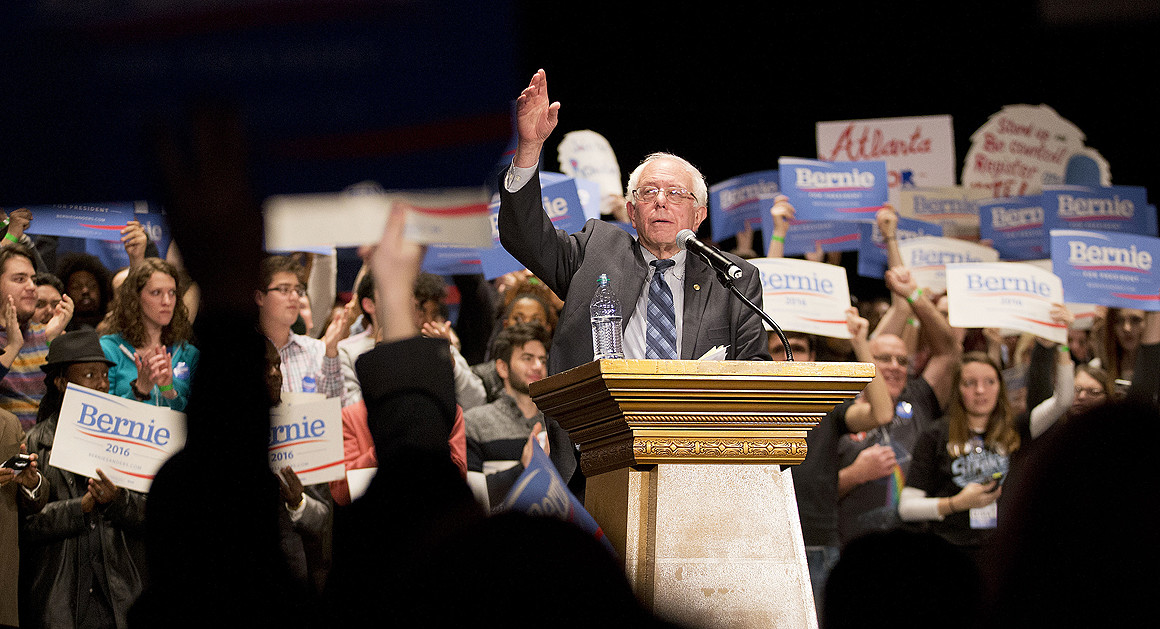
KEOTA, Iowa — Bernie Sanders was eager to turn his fight with the Democratic National Committee into an anti-establishment battle cry that might unite his base and deprive Hillary Clinton a piece of the party she’ll need to secure the nomination.
Trouble is, Iowa Democrats aren’t buying it.
There’s certainly a pricklier political tone in this caucus state after the data breach rocked the Democratic contest last week. But, local activists — Clinton’s, Sanders’ and those who are still neutral — say Sanders failed to turn this dispute into the momentum boost his team intended in Iowa.
“There was anger with the DNC over the data, but it sounds like they got that resolved,” said undecided Linn County Democratic Party Chair Bret Nilles, pointing to Sanders’ apology on the Saturday night debate stage, and relaying conversations he’s had in the state since then. “It’s not an issue that will last in the long run."
That’s not how the Sanders team saw this playing out. After the data breach and the DNC’s decision to temporarily halt the insurgent’s access to his own voter files, the campaign prepped an anti-establishment message and launched a television and fundraising push that attempted to cast Sanders as a progressive hero. It moved his Iowa events to bigger venues, anticipating bigger crowds.
But here, progressive and mainstream Democrats alike say it was a miscalculation; the anti-establishment fervor inside the Democratic Party is simply not as strong as the populist passion driving the GOP primary. Clinton — leading Sanders in a close race in Iowa — has the support of substantial swaths of the progressive movement.
While Sanders, for example, is backed by the National Nurses United union and the American Postal Workers Union, Clinton has 18 national labor unions on her side. He has the support of two co-chairs of the Congressional Progressive Caucus but Clinton has been endorsed by the majority of the group’s members.
He has used failed Chicago mayoral candidate Chuy Garcia as a surrogate in Iowa. But she's backed by progressive hero Tom Harkin, the state's recently retired senator.
And a day after Sanders welcomed formal endorsements from million-member liberal group Democracy For America and the Communications Workers of America union, two national polls showed Clinton now leading Sanders by roughly 20 points among Democrats who self-identify as very liberal.
“I don’t understand [the idea of the progressive vs. establishment] divide, it’s not my lived experience in community after community that our members are in,” Service Employees International Union President Mary Kay Henry told POLITICO, adding that she’d heard no talk of the data breach from her union’s members. “That’s why we endorsed her, why an overwhelming majority of our members in the three national polls that we did endorsed her."
Certainly, the fight with the DNC did not go unnoticed. Franklin County Democratic Party Chairman John Colombo said a small handful of Clinton voters in his county emailed to tell him they were leaning to Sanders out of anger toward the party officials, and Iowa City activist John Deeth said he heard similar talk on Monday.
But, both said, those were exceptions: Throughout Iowa, Democrats are shaking their heads at a tussle they describe as an inside-the-Beltway story with little significance for the rest of the country aside from lingering questions about what, exactly, the Sanders team was doing with Clinton's data.
And if there was any spark left in Sanders’ attempted progressive vs. establishment fight, Clinton seemed this week intent on extinguishing it. She sounded at times just as progressive as Sanders at her packed town hall of 700 here in this rural town of 1,000 — where she fielded questions from students after an introduction from Agriculture Secretary Tom Vilsack, a former Iowa governor, and his wife, Christie, a former congressional candidate.
Appearing in the county that went for John Edwards in 2008, Clinton leaned on liberal policy points, such as infrastructure investment, income inequality, clean energy policy and immigration reform. These focus points, when piled on top of her opposition to the Trans-Pacific Partnership trade deal and the Keystone pipeline — as well as her renewed focus on reining in Wall Street — add up to a clear move to appeal to liberals.
And later Tuesday afternoon in Fairfield, she explicitly made an appeal to Sanders voters, calling herself a "progressive who likes to get things done" while making the case that even his most ardent backers should prefer her over a Republican.
"I would just ask that when this nomination is wrapped up that they come and join with us," she said. When Democrats talk about not voting, she continued, "it thrills the Koch brothers. They do high-fives when they see polls that say that."
Such rhetoric is welcome, say local and national liberals, who have largely moved on from Friday’s chaos.
“There is a concern that any time the establishment says that one candidate is definitely better than anyone else, the establishment doesn’t have the best track record,” said Charles Chamberlain, executive director of the Sanders-backing DFA group that threw its support behind him last week, noting that the DNC data mess fed into Sanders backers’ preconceived beliefs about Clinton’s ties to party grandees.
But, he conceded, “She’ll end up having our support too. If she becomes the nominee."
- Publish my comments...
- 0 Comments
